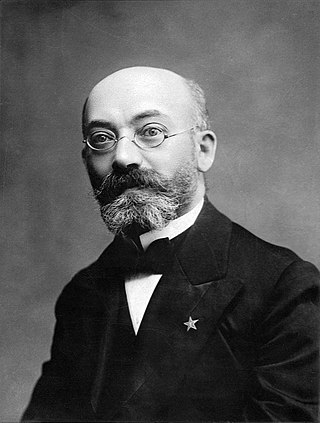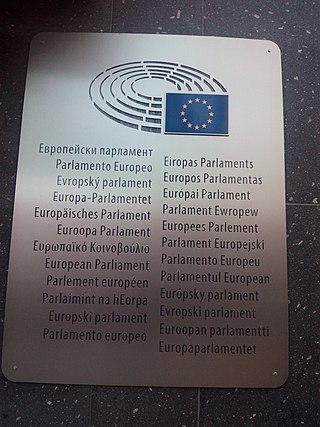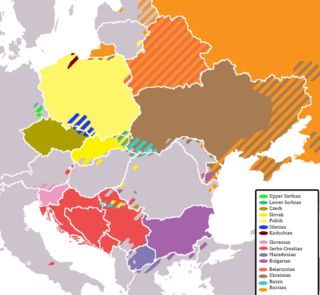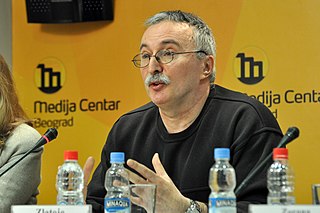Related Research Articles

Esperanto is the world's most widely spoken constructed international auxiliary language. Created by L. L. Zamenhof in 1887, it is intended to be a universal second language for international communication, or "the international language". Zamenhof first described the language in Dr. Esperanto's International Language, which he published under the pseudonym Doktoro Esperanto. Early adopters of the language liked the name Esperanto and soon used it to describe his language. The word esperanto translates into English as "one who hopes".

L. L. Zamenhof was the creator of Esperanto, the most widely used constructed international auxiliary language.
Native Esperanto speakers are people who have acquired Esperanto as one of their native languages. As of 1996, there were 350 or so attested cases of families with native Esperanto speakers. Estimates from associations indicate that there were around 1,000 Esperanto-speaking families, involving perhaps 2,000 children in 2004. In the majority of such families, the parents had the same native language, though in many the parents had different native languages, and only Esperanto in common.
An international auxiliary language is a language meant for communication between people from all different nations, who do not share a common first language. An auxiliary language is primarily a foreign language and often a constructed language. The concept is related to but separate from the idea of a lingua franca that people must use to communicate. The study of international auxiliary languages is interlinguistics.

A number of musical works are available in the Esperanto language. The phrase "Esperanto music" is sometimes used to include music which is about Esperanto.

Ĝ or ĝ is a consonant in Esperanto orthography, representing a voiced postalveolar affricate, and is equivalent to a voiced postalveolar affricate or a voiced retroflex affricate.

Ŝ or ŝ is a consonant in Esperanto orthography, representing the sound.

The European Union (EU) has 24 official languages, of which three – English, French and German – were considered "procedural" languages but this notion was abandoned by the European Commission. In fact English and French are used in the day-to-day workings of the institutions of the EU. Institutions have the right to define the linguistic regime of their working but the Commission and a number of other institutions did not do this as indicated by several Court judgments

Tibor Sekelj, also known as Székely Tibor according to Hungarian orthography, was a Hungarian born polyglot, explorer, author, and 'citizen of the world.' In 1986 he was elected a member of the Academy of Esperanto and an honorary member of the World Esperanto Association. Among his novels, travel books and essays, his novella Kumeŭaŭa, la filo de la ĝangalo, a children's book about the life of Brazilian Indians, was translated into seventeen languages, and in 1987 it was voted best Children's book in Japan. In 2011 the European Esperanto Union declared 2012 "The Year of Tibor Sekelj" to honor the 100th anniversary of his birth.

The spesmilo is an obsolete decimal international currency, proposed in 1907 by René de Saussure and used before World War I by a few British and Swiss banks, primarily the Ĉekbanko Esperantista.

Lidia Zamenhof was a Jewish Polish writer, publisher, translator and the youngest daughter of Klara (Silbernik) and L. L. Zamenhof, the creator of Esperanto. She was an active promoter of Esperanto as well as of Homaranismo, a form of religious humanism first defined by her father.

Vatican City uses Italian in its official documents and as its main working language. However, many other languages are also used by institutions situated within the state, such as the Holy See and the Swiss Guard, as well as personally by its diverse population.
The Brave Adventures of Lapitch, also known as The Marvellous Adventures of Lapich the Apprentice, is a 1913 novel by Croatian children's author Ivana Brlić-Mažuranić.

A pan-Slavic language is a zonal auxiliary language for communication among the Slavic peoples.

Zlatoje Martinov is a Serbian publicist and writer.

The following outline is provided as an overview of and topical guide to Esperanto:
The Esperanto League of Bosnia and Herzegovina is the national Esperanto association in Bosnia and Herzegovina, which represents Esperanto speakers, Esperanto societies, and friends. Since its establishment in 1910, it helps advancement of Esperanto language learning and usage in Bosnia and Herzegovina.
Franjo (Fran) Novljan was a Croatian educator, andragogue, and Esperantist.
References
- 1 2 "Lakoća učenja i humana ideja". Vijenac (in Croatian). No. 385. Matica hrvatska. 4 December 2008. Retrieved 8 July 2019.